2013版初中英语全程复习方略课件(教材复习案)七年级下册 Units 9-12
文档属性
| 名称 | 2013版初中英语全程复习方略课件(教材复习案)七年级下册 Units 9-12 | 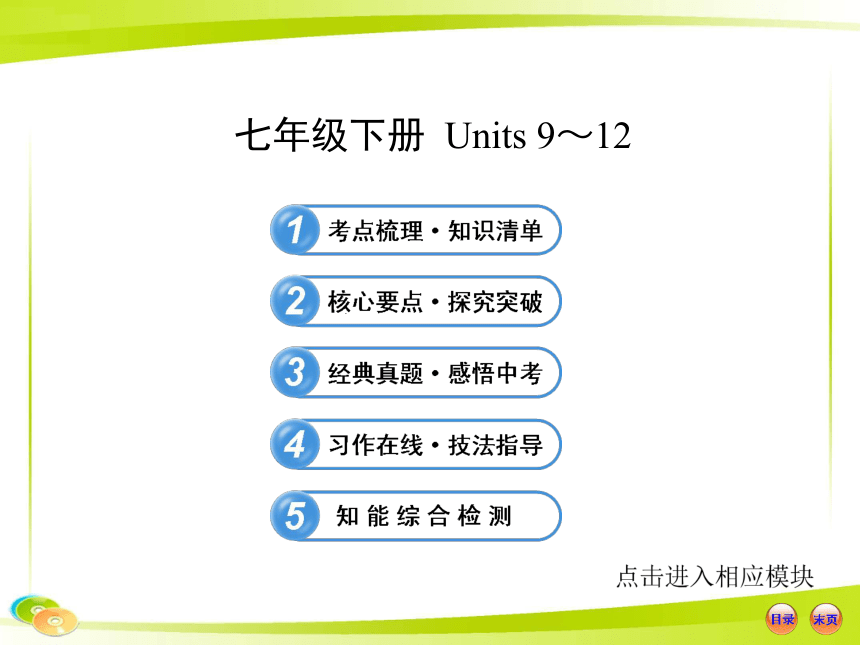 | |
| 格式 | zip | ||
| 文件大小 | 1.2MB | ||
| 资源类型 | 教案 | ||
| 版本资源 | 通用版 | ||
| 科目 | 英语 | ||
| 更新时间 | 2014-02-27 08:49:25 | ||
图片预览

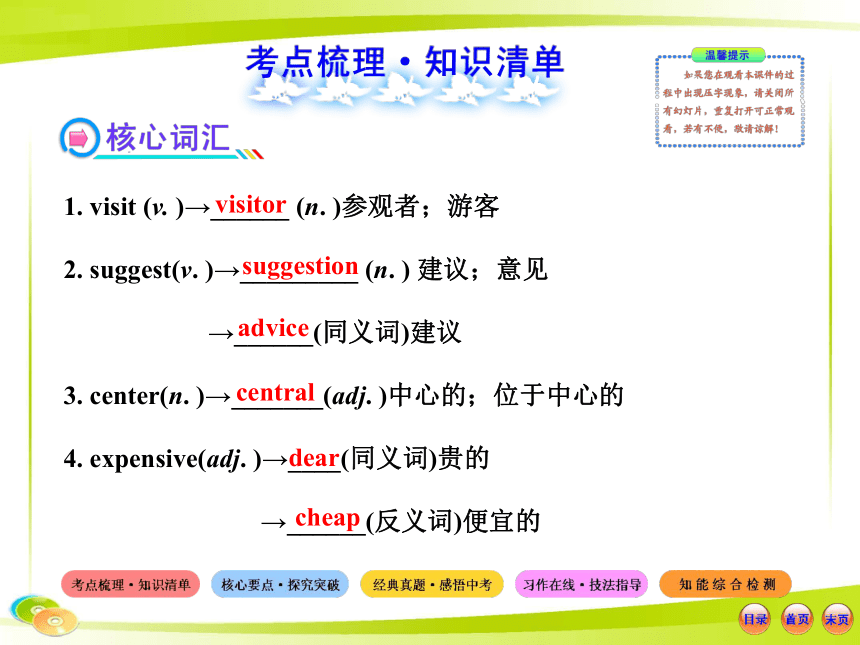
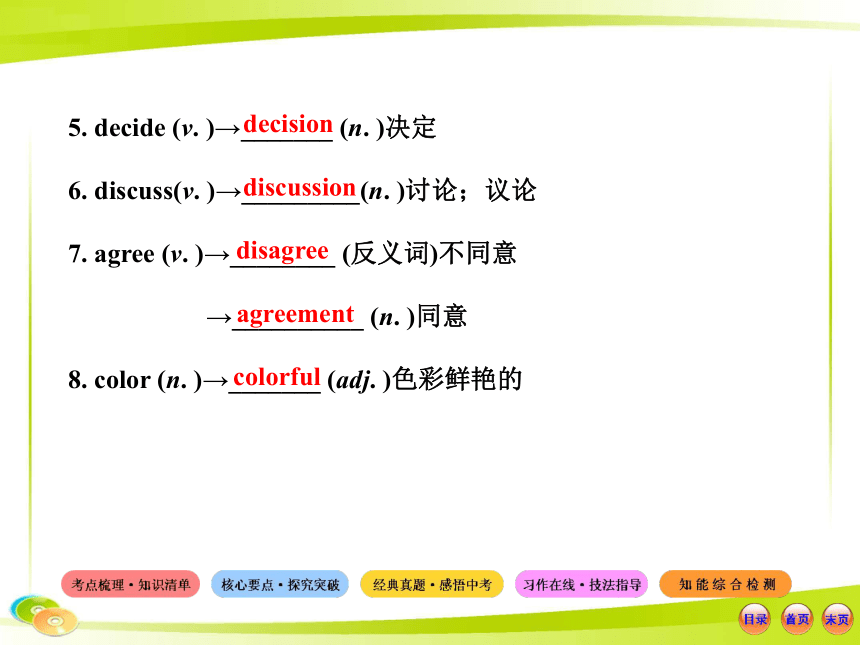
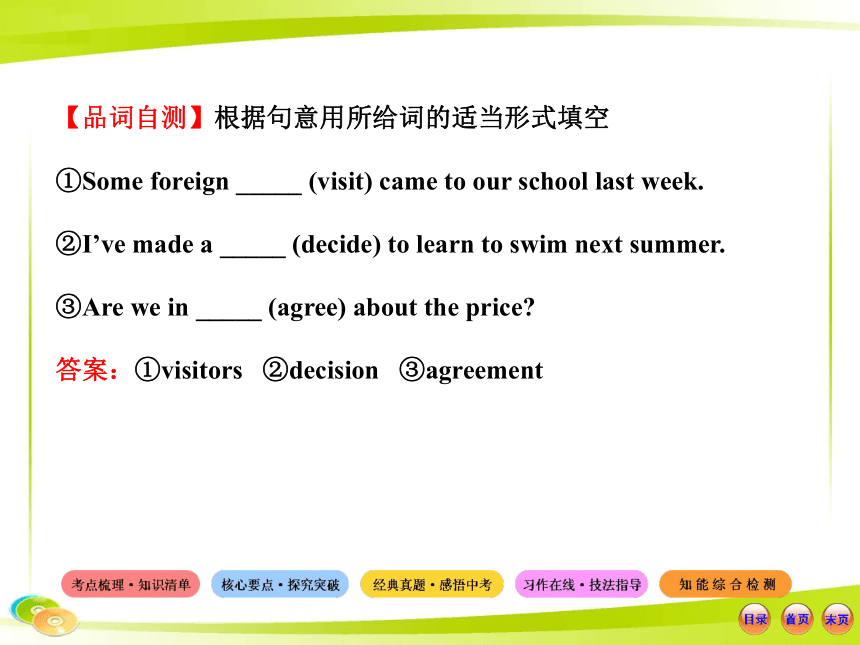
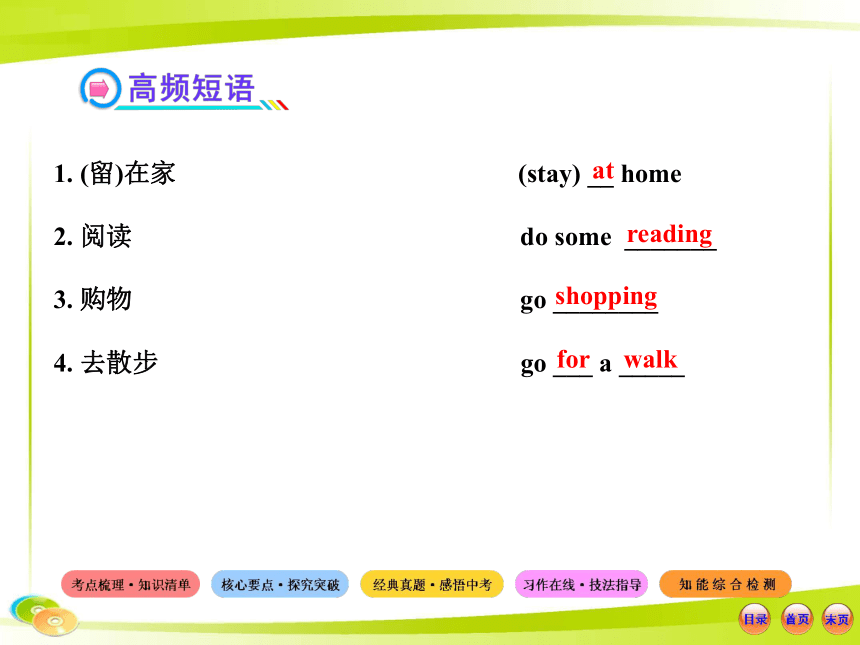
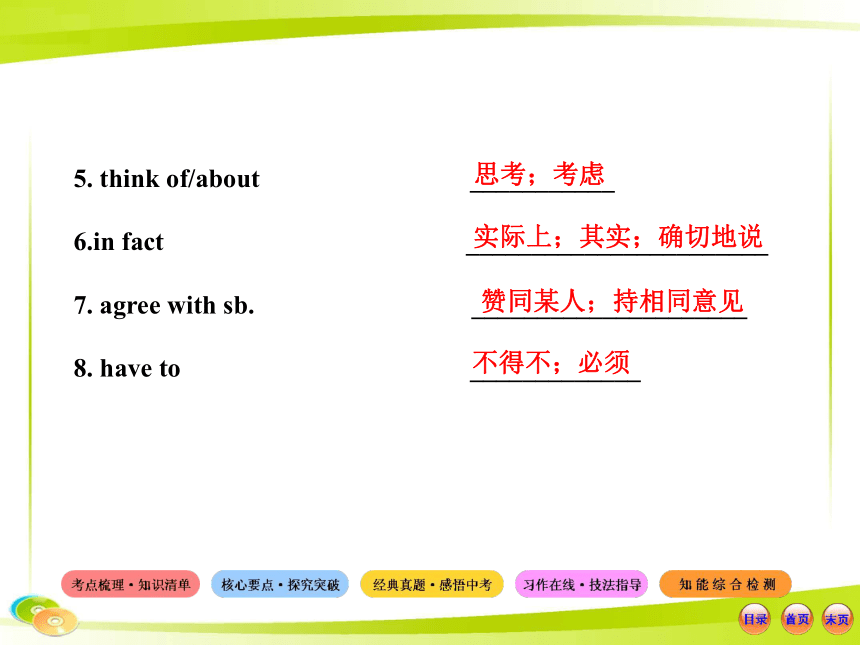
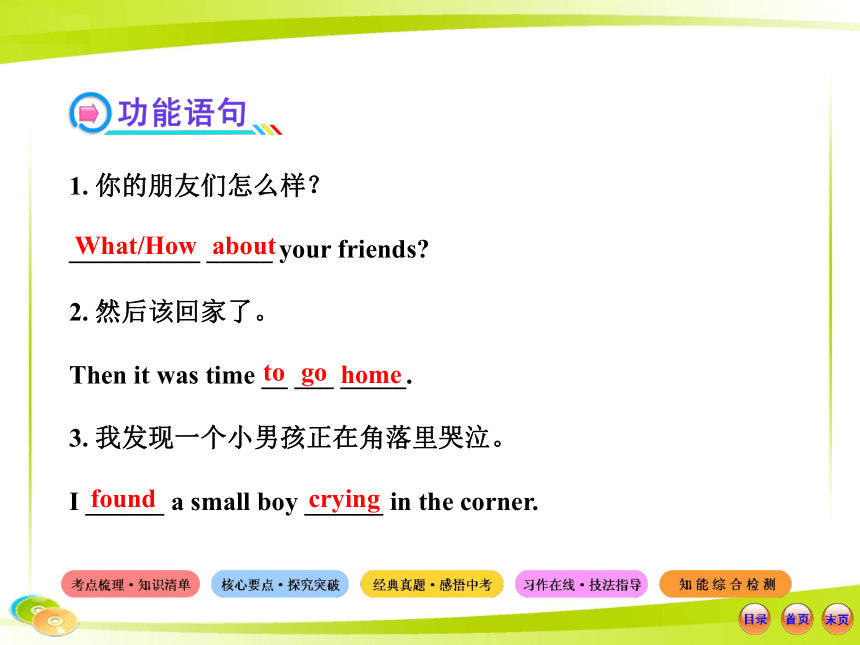
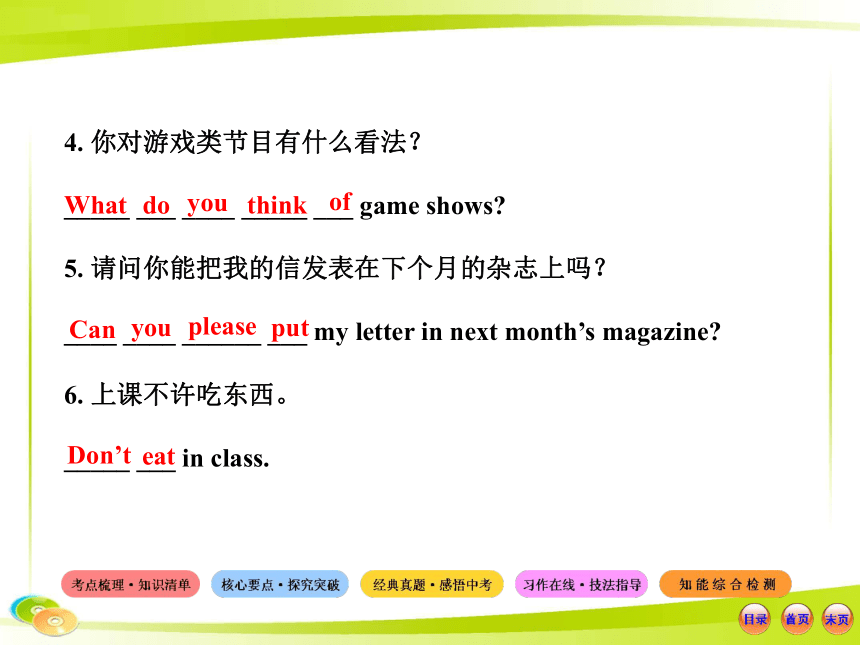
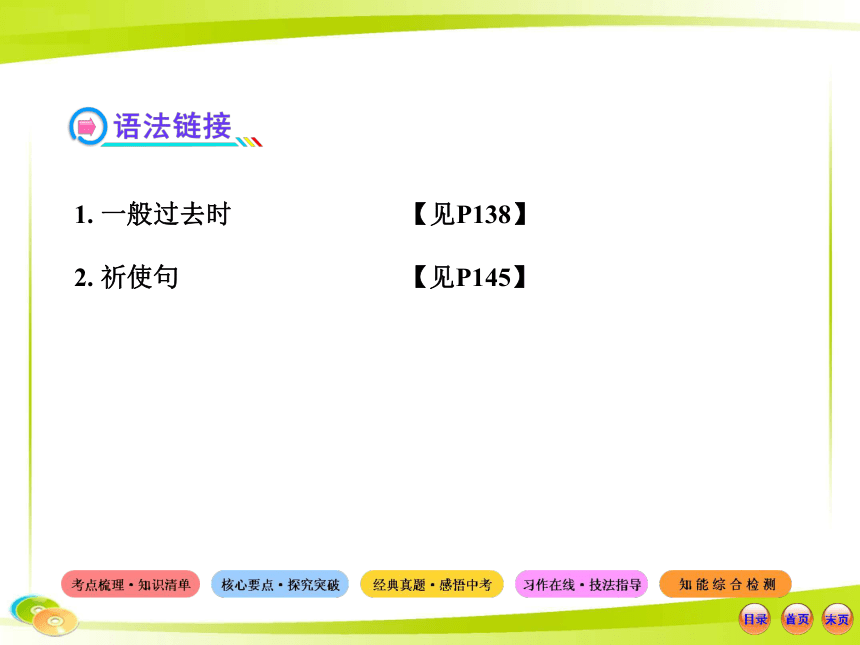
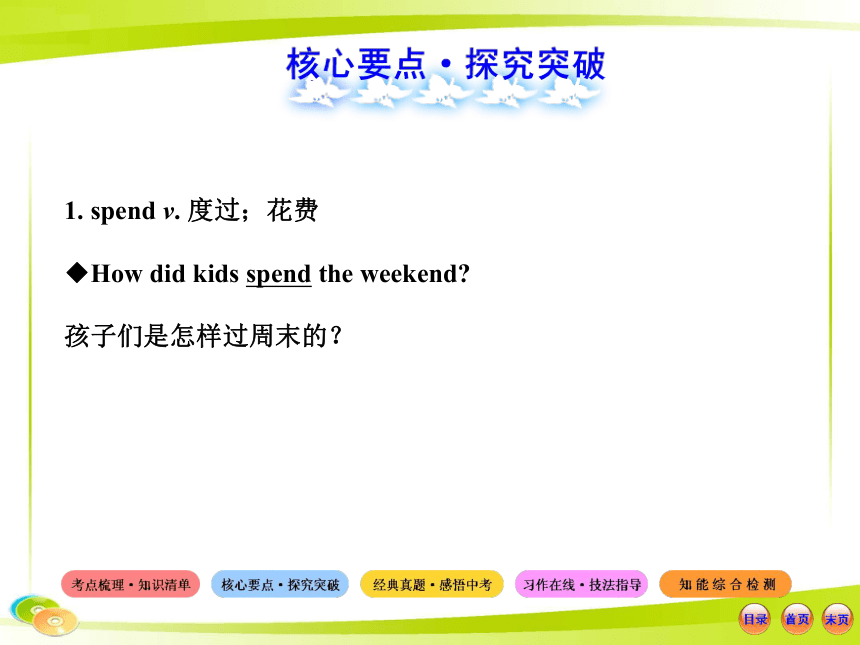
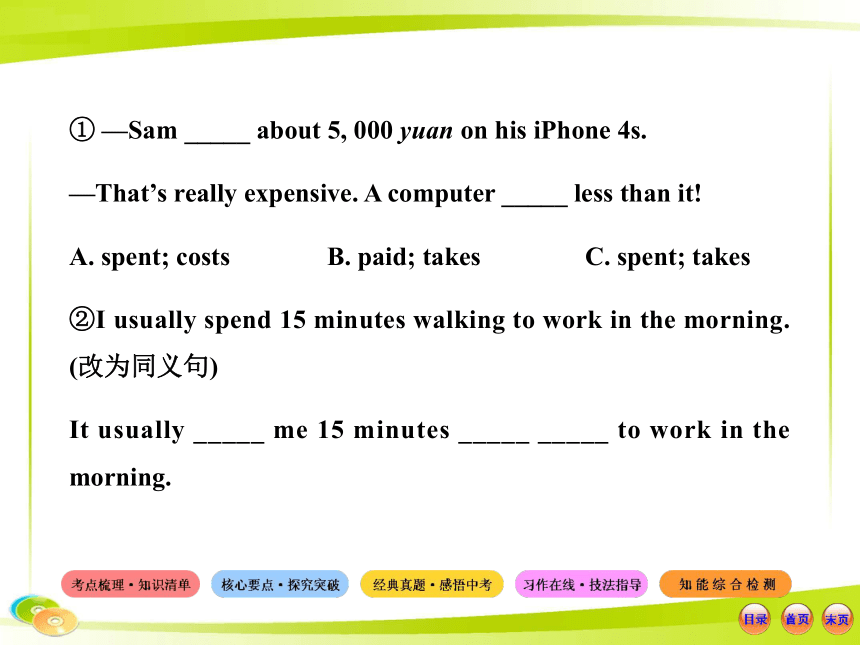
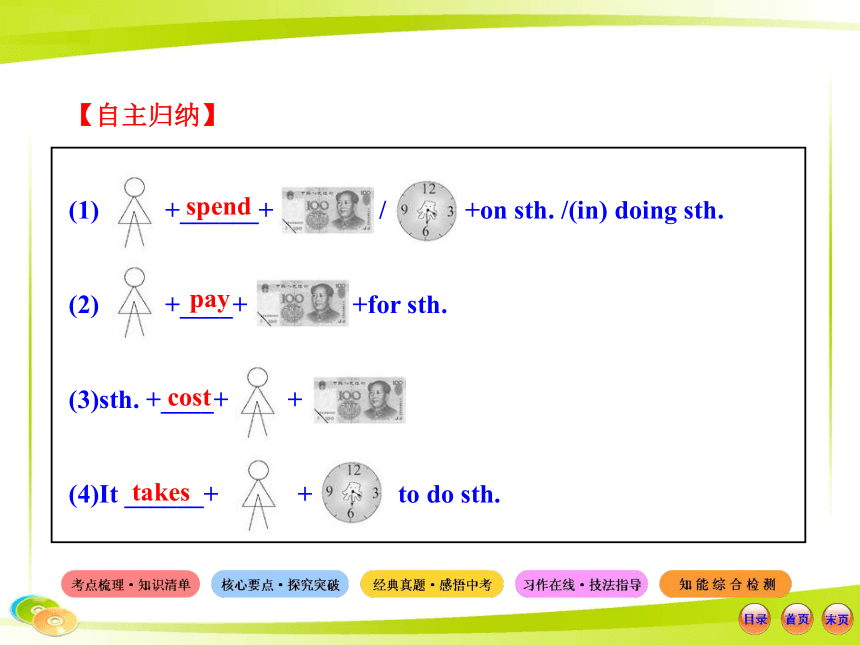
文档简介
课件42张PPT。七年级下册 Units 9~121. visit (v. )→______ (n. )参观者;游客
2. suggest(v. )→_________ (n. ) 建议;意见
→______(同义词)建议
3. center(n. )→_______(adj. )中心的;位于中心的
4. expensive(adj. )→____(同义词)贵的
→______(反义词)便宜的visitorsuggestionadvicecentraldearcheap5. decide (v. )→_______ (n. )决定
6. discuss(v. )→_________(n. )讨论;议论
7. agree (v. )→________ (反义词)不同意
→__________ (n. )同意
8. color (n. )→_______ (adj. )色彩鲜艳的decisiondiscussiondisagreeagreementcolorful【品词自测】根据句意用所给词的适当形式填空
①Some foreign _____ (visit) came to our school last week.
②I’ve made a _____ (decide) to learn to swim next summer.
③Are we in _____ (agree) about the price?
答案:①visitors ②decision ③agreement1. (留)在家 (stay) __ home
2. 阅读 do some _______
3. 购物 go ________
4. 去散步 go ___ a _____atreadingshoppingforwalk5. think of/about ___________
6.in fact _______________________
7. agree with sb. _____________________
8. have to _____________思考;考虑实际上;其实;确切地说赞同某人;持相同意见不得不;必须1. 你的朋友们怎么样?
__________ _____ your friends?
2. 然后该回家了。
Then it was time __ ___ _____.
3. 我发现一个小男孩正在角落里哭泣。
I ______ a small boy ______ in the corner. What/Howabouttogohomefoundcrying4. 你对游戏类节目有什么看法?
_____ ___ ____ _____ ___ game shows?
5. 请问你能把我的信发表在下个月的杂志上吗?
____ ____ ______ ___ my letter in next month’s magazine?
6. 上课不许吃东西。
_____ ___ in class. WhatdoyouthinkCanyoupleaseputDon’teatof1. 一般过去时 【见P138】
2. 祈使句 【见P145】1. spend v. 度过;花费
◆How did kids spend the weekend?
孩子们是怎样过周末的?① —Sam _____ about 5, 000 yuan on his iPhone 4s.
—That’s really expensive. A computer _____ less than it!
A. spent; costs B. paid; takes C. spent; takes
②I usually spend 15 minutes walking to work in the morning. (改为同义句)
It usually _____ me 15 minutes _____ _____ to work in the morning. 【自主归纳】
(1) +______+ / +on sth. /(in) doing sth.
(2) +____+ +for sth.
(3)sth. +____+ +
(4)It ______+ + to do sth. spendpaycosttakes【判断抢答】判断下面句子翻译正误
他花了50元买了件T恤。
①He spent ¥50 on a T-shirt. ( )
②He paid ¥50 for a T-shirt. ( )
③The T-shirt cost him ¥50. ( )
④It took him ¥50 to buy a T-shirt. ( )
答案:①A ②takes; to walk √√√×2. decide v. 决定;下决心
◆We decided to play tennis. 我们决定打网球。
①Many people decided _____ (stop) buying houses when the price started to get down.
②I made a _____ (decide) to find a part-time job to reduce my parents’ pressure. 【自主归纳】decide的用法辨析
(1)decide的名词是_______;
(2)decide _____sth. =make a decision to do sth.
=make up one’s mind to do sth. 决定做某事;
(3)decide on最终决定(某种决定)。 decisionto do【一言巧辨异】We’ve decided to take a long vacation this summer, but we haven’t made a decision about where to go yet. I hope my parents can decide on Dalian, because I’d like to visit my aunt there.
我们已经决定今年夏天度长假, 但我们还没有决定去哪儿。我希望父母可以决定去大连, 因为我想去那儿看望我姑妈。
答案:①to stop ②decision3. go shopping 去购物
◆On Saturday afternoon, five kids, and three went shopping went to the library.
在周六的下午, 五个孩子去购物, 三个去了图书馆。
①People can enjoy going _____ a lot in summer.
A. swim B. swam C. swimming②—There’s little milk in the fridge. Let’s go _____ in the afternoon.
—OK. I’d like to get some school things, too.
A. shopping B. hiking C. fishing【自主归纳】go+v. -ing构成的短语
(1)“go+v. -ing”表示从事某种(户外)活动。类似短语有:(2)“do some +v. -ing”表示“做某事”, 意义与动词原义相同。
You can _________________in the water park.
(=You can _____ in the water park. )
答案:①C ②Ado some swimmingswim4. have to不得不;必须
◆What else do you have to do? 你还必须做什么?
①Cindy got up late this morning, so she _____ _____ (不得不) take a taxi to school.
②You needn’t clean the window—I did it yesterday.
A. mustn’t B. can’t
C. don’t have to【自主归纳】have to/must的用法辨析
答案:①had to ②Cneedn’tneedn’tcan’t5. Don’t eat in class. 上课不许吃东西。
①You mustn’t play soccer in the street. (改为祈使句)
_____ _____ soccer in the street.
②—Boys, don’t play soccer near the office.
—_____ .
A. It doesn’t matter
B. We can’t do it
C. Sorry, we won’t do that again【自主归纳】祈使句用法小结
(1)Don’t do sth. 表示“禁止;不要”, 反意疑问句中常用will you或OK;
(2)Don’t do sth. 可以替换同义句You shouldn’t/mustn’t do sth. 或No+v. -ing形式;如Don’t swim in the river. =No swimming in the river. =You mustn’t swim in the river. ;
(3)Don’t do sth. 可以表示批评建议, 答语常用Sorry, I won’t do that again. 等。
答案:①Don’t play ②CⅠ. 用所给词的适当形式填空
1. (2011·徐州中考) I’m patient. I don’t mind _____ (wait) for people.
2. (2011·无锡中考) The Women’s World Cup _____ (not begin) until 1991 when China hosted it in Guangzhou. 【归纳总结】not. . . until的用法
(1)not. . . until. . . 直到……才……, 引导时间状语从句;
(2)not. . . until. . . 常用来与after引导的时间状语从句进行同义句转化。例如:
Dave went to bed _____ he finished his homework.
同义句:Dave ________to bed _____ he finished his homework.
答案:1. waiting 2. didn’t beginafterdidn’t gountilⅡ. 单项选择
1. (2012·黔西南州中考)—Would you mind if I open the window?
— _____ I got a cold.
A. You’d better not. B. Never mind.
C. Of course not. D. All right.
【解析】选A。考查交际用语。由答句句意“我感冒了”, 知是介意的, 最好不要打开窗户。2. (2012·黔西南州中考)—What about _____ a rest?
—OK! Let’s go for a walk.
A. to have B. had C. have D. having
【解析】选D。考查What/How about+v. -ing? 形式。about在此是介词, 后跟v. -ing形式。3. (2012·重庆中考)Jack, _____ , or you will get heavier.
A. doesn’t play sports any more
B. doesn’t eat so much meat
C. don’t play sports any more
D. don’t eat so much meat
【解析】选D。考查祈使句的用法。一般否定祈使句句式:don’t+动词原形开头, 句意:杰克, 不要吃太多的肉, 否则你会变更胖。故选D。4. (2012·滨州中考) _____ the afternoon of June 2nd, many foreigners arrived _____ Shanghai.
A. In; at B. On; to
C. In; in D. On; in
【解析】选D。考查介词的用法辨析。在具体某一天的上午、下午或晚上用介词on; arrive in后跟大地点, arrive at后跟小地点。故选D。 5. (2011·成都中考)—The T-shirt looks nice on you! How much does it _____ ?
—I just _____ ten dollars for it.
A. take; afforded B. cost; paid
C. cost; spent
【解析】选B。第一空表示“(物品)价值多少钱”, 用cost; 第二空根据介词for判断使用pay. . . for. . . 结构。 6. (2011·遵义中考)—Mum, doing homework all the time makes me a dull. What about going for a picnic?
— _____ .
A. Help yourself
B. Good idea
C. You’re welcome
【解析】选B。问句What about. . . ? 表示建议, 常用“Good idea. / That sounds good. /Why not? ”等句式应答。7. (2011·广东中考)It’s time _____ the weather report. Turn on the radio, please.
A. to B. in C. at D. for
【解析】选D。It’s time for sth. =It’s time to do sth. 该做某事了。 看图记事在中考考查中常以半命题或开放命题形式呈现, 以记叙学生身边事例为主。在写作此类话题作文过程中要特别注意三“当”:1. 时态恰当, 2. 条理妥当, 3. 发挥适当。【典题示例】
(2011·龙东中考)
这是刘明上周日在公园发生的事情, 请根据图片内容写一篇文章。 提示词: run after a goat; get lost
作文要求:
1. 要求字迹工整, 语法正确, 意思连贯, 合乎逻辑, 可适当发挥。
2. 词数要求:80个左右。
________________________________________________________________________________________________________________________________________________________________________________________________________________________【审题谋篇】
1. 本篇要求叙述刘明上周日经历的事情的经过, 应使用记叙文体。
2. 人称:第三人称。
3. 主要时态:一般过去时。4. 高分模板:【佳作诵读】
Last Sunday, Liu Ming and his friends went for a picnic at the foot of the mountain. Some of them were playing games, and others were dancing. They felt very relaxed. Suddenly, Liu Ming saw a goat running. He was interested in it and ran after it for a long time. When he thought of his friends, he didn’t know where he was. He got lost. At that time, a farmer came. With his help, Liu Ming found his friends again. He thanked the farmer and said goodbye to him. 【名师点睛】
(1)文中以last Sunday, suddenly, when, at that time等多种形式的时间状语把图画内容进行了巧妙连接, 使得故事内容更完整, 结构更合理。
(2)Some. . . others. . . 和with one’s help等短语的应用让文章结构更富于变化, 也体现出作者较强的语言驾驭能力。
2. suggest(v. )→_________ (n. ) 建议;意见
→______(同义词)建议
3. center(n. )→_______(adj. )中心的;位于中心的
4. expensive(adj. )→____(同义词)贵的
→______(反义词)便宜的visitorsuggestionadvicecentraldearcheap5. decide (v. )→_______ (n. )决定
6. discuss(v. )→_________(n. )讨论;议论
7. agree (v. )→________ (反义词)不同意
→__________ (n. )同意
8. color (n. )→_______ (adj. )色彩鲜艳的decisiondiscussiondisagreeagreementcolorful【品词自测】根据句意用所给词的适当形式填空
①Some foreign _____ (visit) came to our school last week.
②I’ve made a _____ (decide) to learn to swim next summer.
③Are we in _____ (agree) about the price?
答案:①visitors ②decision ③agreement1. (留)在家 (stay) __ home
2. 阅读 do some _______
3. 购物 go ________
4. 去散步 go ___ a _____atreadingshoppingforwalk5. think of/about ___________
6.in fact _______________________
7. agree with sb. _____________________
8. have to _____________思考;考虑实际上;其实;确切地说赞同某人;持相同意见不得不;必须1. 你的朋友们怎么样?
__________ _____ your friends?
2. 然后该回家了。
Then it was time __ ___ _____.
3. 我发现一个小男孩正在角落里哭泣。
I ______ a small boy ______ in the corner. What/Howabouttogohomefoundcrying4. 你对游戏类节目有什么看法?
_____ ___ ____ _____ ___ game shows?
5. 请问你能把我的信发表在下个月的杂志上吗?
____ ____ ______ ___ my letter in next month’s magazine?
6. 上课不许吃东西。
_____ ___ in class. WhatdoyouthinkCanyoupleaseputDon’teatof1. 一般过去时 【见P138】
2. 祈使句 【见P145】1. spend v. 度过;花费
◆How did kids spend the weekend?
孩子们是怎样过周末的?① —Sam _____ about 5, 000 yuan on his iPhone 4s.
—That’s really expensive. A computer _____ less than it!
A. spent; costs B. paid; takes C. spent; takes
②I usually spend 15 minutes walking to work in the morning. (改为同义句)
It usually _____ me 15 minutes _____ _____ to work in the morning. 【自主归纳】
(1) +______+ / +on sth. /(in) doing sth.
(2) +____+ +for sth.
(3)sth. +____+ +
(4)It ______+ + to do sth. spendpaycosttakes【判断抢答】判断下面句子翻译正误
他花了50元买了件T恤。
①He spent ¥50 on a T-shirt. ( )
②He paid ¥50 for a T-shirt. ( )
③The T-shirt cost him ¥50. ( )
④It took him ¥50 to buy a T-shirt. ( )
答案:①A ②takes; to walk √√√×2. decide v. 决定;下决心
◆We decided to play tennis. 我们决定打网球。
①Many people decided _____ (stop) buying houses when the price started to get down.
②I made a _____ (decide) to find a part-time job to reduce my parents’ pressure. 【自主归纳】decide的用法辨析
(1)decide的名词是_______;
(2)decide _____sth. =make a decision to do sth.
=make up one’s mind to do sth. 决定做某事;
(3)decide on最终决定(某种决定)。 decisionto do【一言巧辨异】We’ve decided to take a long vacation this summer, but we haven’t made a decision about where to go yet. I hope my parents can decide on Dalian, because I’d like to visit my aunt there.
我们已经决定今年夏天度长假, 但我们还没有决定去哪儿。我希望父母可以决定去大连, 因为我想去那儿看望我姑妈。
答案:①to stop ②decision3. go shopping 去购物
◆On Saturday afternoon, five kids, and three went shopping went to the library.
在周六的下午, 五个孩子去购物, 三个去了图书馆。
①People can enjoy going _____ a lot in summer.
A. swim B. swam C. swimming②—There’s little milk in the fridge. Let’s go _____ in the afternoon.
—OK. I’d like to get some school things, too.
A. shopping B. hiking C. fishing【自主归纳】go+v. -ing构成的短语
(1)“go+v. -ing”表示从事某种(户外)活动。类似短语有:(2)“do some +v. -ing”表示“做某事”, 意义与动词原义相同。
You can _________________in the water park.
(=You can _____ in the water park. )
答案:①C ②Ado some swimmingswim4. have to不得不;必须
◆What else do you have to do? 你还必须做什么?
①Cindy got up late this morning, so she _____ _____ (不得不) take a taxi to school.
②You needn’t clean the window—I did it yesterday.
A. mustn’t B. can’t
C. don’t have to【自主归纳】have to/must的用法辨析
答案:①had to ②Cneedn’tneedn’tcan’t5. Don’t eat in class. 上课不许吃东西。
①You mustn’t play soccer in the street. (改为祈使句)
_____ _____ soccer in the street.
②—Boys, don’t play soccer near the office.
—_____ .
A. It doesn’t matter
B. We can’t do it
C. Sorry, we won’t do that again【自主归纳】祈使句用法小结
(1)Don’t do sth. 表示“禁止;不要”, 反意疑问句中常用will you或OK;
(2)Don’t do sth. 可以替换同义句You shouldn’t/mustn’t do sth. 或No+v. -ing形式;如Don’t swim in the river. =No swimming in the river. =You mustn’t swim in the river. ;
(3)Don’t do sth. 可以表示批评建议, 答语常用Sorry, I won’t do that again. 等。
答案:①Don’t play ②CⅠ. 用所给词的适当形式填空
1. (2011·徐州中考) I’m patient. I don’t mind _____ (wait) for people.
2. (2011·无锡中考) The Women’s World Cup _____ (not begin) until 1991 when China hosted it in Guangzhou. 【归纳总结】not. . . until的用法
(1)not. . . until. . . 直到……才……, 引导时间状语从句;
(2)not. . . until. . . 常用来与after引导的时间状语从句进行同义句转化。例如:
Dave went to bed _____ he finished his homework.
同义句:Dave ________to bed _____ he finished his homework.
答案:1. waiting 2. didn’t beginafterdidn’t gountilⅡ. 单项选择
1. (2012·黔西南州中考)—Would you mind if I open the window?
— _____ I got a cold.
A. You’d better not. B. Never mind.
C. Of course not. D. All right.
【解析】选A。考查交际用语。由答句句意“我感冒了”, 知是介意的, 最好不要打开窗户。2. (2012·黔西南州中考)—What about _____ a rest?
—OK! Let’s go for a walk.
A. to have B. had C. have D. having
【解析】选D。考查What/How about+v. -ing? 形式。about在此是介词, 后跟v. -ing形式。3. (2012·重庆中考)Jack, _____ , or you will get heavier.
A. doesn’t play sports any more
B. doesn’t eat so much meat
C. don’t play sports any more
D. don’t eat so much meat
【解析】选D。考查祈使句的用法。一般否定祈使句句式:don’t+动词原形开头, 句意:杰克, 不要吃太多的肉, 否则你会变更胖。故选D。4. (2012·滨州中考) _____ the afternoon of June 2nd, many foreigners arrived _____ Shanghai.
A. In; at B. On; to
C. In; in D. On; in
【解析】选D。考查介词的用法辨析。在具体某一天的上午、下午或晚上用介词on; arrive in后跟大地点, arrive at后跟小地点。故选D。 5. (2011·成都中考)—The T-shirt looks nice on you! How much does it _____ ?
—I just _____ ten dollars for it.
A. take; afforded B. cost; paid
C. cost; spent
【解析】选B。第一空表示“(物品)价值多少钱”, 用cost; 第二空根据介词for判断使用pay. . . for. . . 结构。 6. (2011·遵义中考)—Mum, doing homework all the time makes me a dull. What about going for a picnic?
— _____ .
A. Help yourself
B. Good idea
C. You’re welcome
【解析】选B。问句What about. . . ? 表示建议, 常用“Good idea. / That sounds good. /Why not? ”等句式应答。7. (2011·广东中考)It’s time _____ the weather report. Turn on the radio, please.
A. to B. in C. at D. for
【解析】选D。It’s time for sth. =It’s time to do sth. 该做某事了。 看图记事在中考考查中常以半命题或开放命题形式呈现, 以记叙学生身边事例为主。在写作此类话题作文过程中要特别注意三“当”:1. 时态恰当, 2. 条理妥当, 3. 发挥适当。【典题示例】
(2011·龙东中考)
这是刘明上周日在公园发生的事情, 请根据图片内容写一篇文章。 提示词: run after a goat; get lost
作文要求:
1. 要求字迹工整, 语法正确, 意思连贯, 合乎逻辑, 可适当发挥。
2. 词数要求:80个左右。
________________________________________________________________________________________________________________________________________________________________________________________________________________________【审题谋篇】
1. 本篇要求叙述刘明上周日经历的事情的经过, 应使用记叙文体。
2. 人称:第三人称。
3. 主要时态:一般过去时。4. 高分模板:【佳作诵读】
Last Sunday, Liu Ming and his friends went for a picnic at the foot of the mountain. Some of them were playing games, and others were dancing. They felt very relaxed. Suddenly, Liu Ming saw a goat running. He was interested in it and ran after it for a long time. When he thought of his friends, he didn’t know where he was. He got lost. At that time, a farmer came. With his help, Liu Ming found his friends again. He thanked the farmer and said goodbye to him. 【名师点睛】
(1)文中以last Sunday, suddenly, when, at that time等多种形式的时间状语把图画内容进行了巧妙连接, 使得故事内容更完整, 结构更合理。
(2)Some. . . others. . . 和with one’s help等短语的应用让文章结构更富于变化, 也体现出作者较强的语言驾驭能力。
